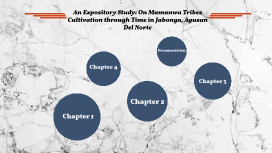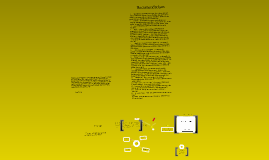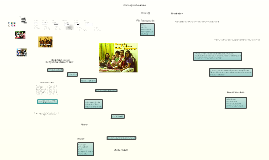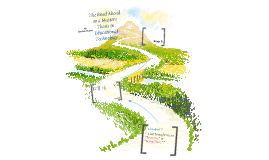Thesis Defense Presentation
Transcript: An Expository Study: On Mamanwa Tribes Cultivation through Time in Jabonga, Agusan Del Norte Introduction Chapter 1 In Mindanao, the aeta known as the mamanwa who lives in the northeastern provinces of Surigao and Agusan. The researchers have decided to conduct a study on mamanwa tribes cultivation through time in Jabonga, Agusan Del Norte. The term mamanwa means ¨First forest dwellers¨, derived from ¨man (first) and ¨banwa (forest). However, they are popularly called ¨kong king¨ because of their kinki hair. According to anthropologist, one theory suggest that the Mamanwa are the descendants of the original inhabitants of the Philippines who arrived through land bridges that linked the country with the Asia mainland some 50,000 years ago. Review of Literature and Studies The Mamanwa is one of the oldest ethnic inhabitants in the Philippines particularly in Caraga, bearing a distinctive class of breed. Their physical features have an equal and parallel similarity to the Negritos and Manobos with dark-skin complexion, kinky-curled-hair, snub-nose and black eyes The political system of the Mamanwas is informal democracy and age-structured, the chieftain may be a man or a woman and is referred to as Tambayong or Datu is the one who presides the duties of counseling tribal members, speaking at gatherings and arbitrating disagreements within the tribe. The Mamanwas believe in nature’s spirits also known as anitos/anitas and the supreme deity Magbabaya. However due to cross-cultural exchanges among the lowlanders, their religious belief has been swayed and even considered by the lowlanders as savage and such. Local Studies Mamanwas are nomadic, men went to forage in the forest and hunt for food only returning to their territories only to deliver and share their catch to everyone. Few of them own lands and culture their own crops such as camote also called sweet potatoes, and more acculturated also have domesticated pigs and chickens for food and their rituals. Despite their lack of education and living conditions, their traits of resilience and positive attitude towards life are what contributed to their survival and to thrive in the future ahead of them. However, they are also engaged in making and selling products to augment their income for their daily sustenance. The products that they produced are handicrafts and souvenir items which they made manually or traditionally. The Mamanwas oral literature comprises mainly on prose and poetry, in pose evident are of folktale and myths and poetry have high fascination for songs they refer to as tud-om (Mamanwa Tales with Cultural and Linguistic Notes, Daryll M. et. al). These mirror various issues in their society such as social, political, and religious concerns. The Mamanwas are one of the IP Communities in Caraga region, the other includes the Manobo, Talaandig, Banwaon, Higaanon and among others. Moreover, the Mamanwas are lesser in population than the latter and in particular, had been the vanguard of their indigenous knowledge system, institutions and leadership practices. They have actively worked for the preservation of its arts and crafts for posterity as part of Filipino cultural heritage. The well preserved Mamanwa indigenous leadership system illustrated their desire to protect these institutions as community priceless knowledge and heritage. Conceptual Framework Statement of the Problem The study aims to address the study and answer the following: 1. How does the Mamanwa Tribe of Jabonga, Agusan Del Norte cope with civilization? 2. What are the challenges the Mamanwa Tribe of Jabonga, Agusan Del Norte face on a daily basis and how were they able to overcome? (insert identifying cultural practices before and nowadays). 3. What does the Mamanwa Tribe of Jabonga, Agusan Del Norte do for living? 4. What are the qualities of this tribe to survive on a daily basis? 5. How does the Mamanwa Tribe of Jabonga, Agusan Del Norte preserve their culture? 6. What are the ways to pass on socio-cultural activities to family members? Hypothesis Ha: The civilization takes place on Mamanwa Tribes cultivation through time in Jabonga, Agusan Del Norte. Ho: The civilization does not take place on Mamanwa Tribe cultivation through time in Jabonga, Agusan Del Norte. Significance of the Study This study will be undertaken to know the Mamanwa Tribes Cultivation through time in Jabonga, Agusan Del Norte. This study will benefit the following: The Community, Mamanwa Tribe of Jabonga, Agusan Del Norte can benefit. They may be given the chance to emphasize and elaborate their culture towards everyone. The Student, the students and Researchers will be able to know and have knowledge about the said study. The Future Researchers, this study may be used as a reference for future upcoming researchers for their basis. Methodology Chapter 2 Research Design - the study is an expository and qualitative method, a process of collecting, analyzing, and interpreting non-numerical data, such as

















